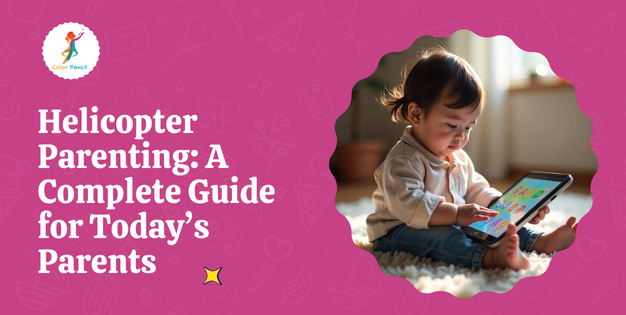
Top 10 Flashcard Combos for Holistic Toddler Learning
Did you know that up to 80% of a toddler’s brain develops in the first five years? As a parent, you’re likely eager to give

Understanding, Balancing, and Making it Work for You
Every responsibility comes with choices, feelings, and the need to guard our kids from danger, especially parenting. One of the most talked-about parenting styles is helicopter parenting. Have you found yourself being overprotective? Noticing that you monitor your kid’s life and step in whenever things start to get tough? Well, let me tell you, you’re not the only one. Blame it on parental instinct – many tend to adopt this style due to genuine care.
Now, let’s delve deeper into what helicopter parenting is – its advantages as well as its challenges, the reason behind it, and how one can maintain a balance.

Helicopter parenting is a very involved style of parenting in which adults constantly “hover “over their children and monitor, guide, or interfere at any given moment, such as when a child is facing challenges. The term helicopter parenting might appear harsh, but it fundamentally comes from caring too much.
This phrase became mainstream in the 2000s when teachers observed a significant change in the involvement of parents in the social and educational activities of the children, which was overbearing at times, with decisions usually made independently by the children.
Every action of a helicopter parent often comes from a place of love, care, and fear.
Common reasons include:
For many parents, the world feels more competitive and uncertain than ever, so stepping in often feels like the safest choice.
Despite some negative perceptions, helicopter parenting does have benefits when done thoughtfully:
In moderation, attentiveness is not only helpful but necessary, particularly for younger children who genuinely need more support.

When involvement becomes over-involvement, however, certain challenges may arise:
These challenges are not inevitable but are common when boundaries are not balanced.
Being a caring and involved parent is not the issue — it’s about finding the right balance. Here are ways to keep the positives of this style while fostering your child’s independence:
Give your child opportunities to try, fail, and learn. Mistakes are valuable teachers.
Offer choices and let your child take part in everyday decisions, from picking clothes to managing schedules.
Instead of fixing problems immediately, guide your child to brainstorm solutions.
Ask yourself: “Am I stepping in because my child needs help, or because I am uncomfortable watching them struggle?”
Show how you handle challenges calmly and positively. Children learn more from what they observe than what they are told.
There are situations where stepping in is essential:
In these cases, guidance is not just helpful — it is necessary. The goal is not to abandon involvement but to adjust it as your child grows.
Feeling Overwhelmed? Let’s Talk! Join Our Parent Forum and Get Expert Advice & Support!
Helicopter parenting does not equate to being a “bad” or “overbearing” parent. It’s love sometimes given too profoundly. With time, change from control to collaboration in parenting, letting children exercise confidence, resilience, and independence with the security that you will always be there when needed.
Always keep in mind that parenting is a process, and small tweaks over time can be very impactful.